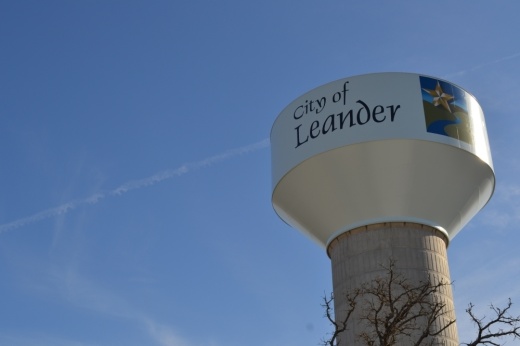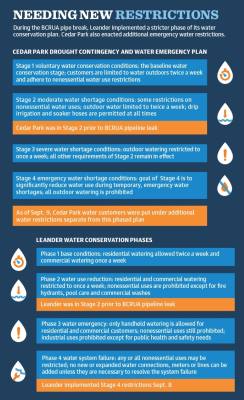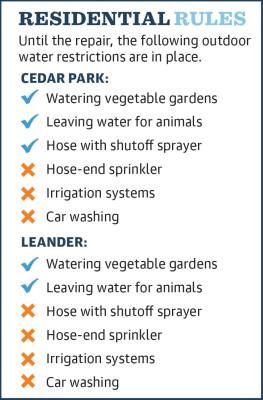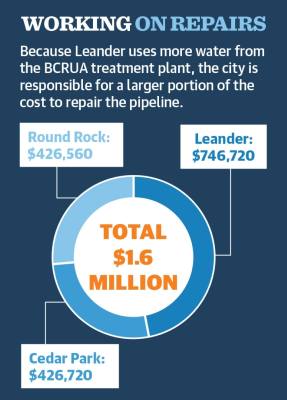Repairs began Sept. 21 to the pipeline that feeds water from Lake Travis to the BCRUA treatment plant.
While the repair’s estimated completion date of Oct. 4 is not guaranteed, city officials said emergency restrictions will not be in place longer than necessary.
In Cedar Park, these emergency restrictions allow only handheld hose watering with a water shutoff sprayer. All watering through irrigation systems, hose-end sprinklers, soaker hoses and drip irrigation is prohibited, according to the city.
However, Leander residents are under stricter restrictions as the city aimed to get water usage below a threshold the city’s local water treatment plant is capable of handling.
Leander entered Stage 4 of its Water Conservation Plan—restricting all outdoor watering, including hand-held watering—on Sept. 8.
City officials are urging water customers to shut irrigation systems off completely and limit other nonessential uses. The city has also closed splash pads in Lakewood and Bledsoe parks, delayed new meter installations and prohibited all water connections for construction-related activities, according to city documents.
This is because Leander relies on the BCRUA for a bigger portion of its water supply than Cedar Park.
"Each city will have different water restriction plans because we’re very different in our capacities,” said Sam Roberts, Cedar Park assistant city manager, at an Aug. 25 council meeting.
Required repairs
Divers discovered the leak in the BCRUA pipe Aug. 8 during a routine monthly inspection, officials said.
The leak was found on a portion of the pipe that broke in December 2020 and was repaired in May 2021. That same break is failing again, Leander Executive Director of Infrastructure Dan Grimsbo said at the Aug. 18 council meeting. Officials are still uncertain about what may have caused the leak.
Repairs are estimated to cost $1.6 million, which will be split among BCRUA member cities. Cedar Park’s portion of the cost is $426,720, while Leander’s is $746,720. Leander pays more for BCRUA projects because the city receives more BCRUA water.
In fact, a majority of Leander’s water comes from the BCRUA plant. Its local plant, the Sandy Creek Regional Water Plant, has a production capacity of 10 million gallons per day, or mgd. Meanwhile, Leander typically has 15.1 mgd of the total 32.5 mgd from the BCRUA plant available to use.
During the pipeline repair, Leander officials are aiming to reduce water usage to 9 mgd. Leander hit this range the week of Sept. 12, Director of Public Works Gina Ellison said at the Sept. 15 council meeting.
Mayor Christine DeLisle said she is confident in the city’s ability to maintain the reduced water usage.
“Most people have been super respectful of [the restrictions],” she said. “They understand we’re all in this together. This isn’t anything that the city did wrong, or management at BCRUA ... has done wrong. This is a defect in a pipeline, and it’s got to be fixed—this isn’t in perpetuity; this is just a few weeks.”
Cedar Park is relying on its local plant, which produces 75% of the city’s water supply, during the repair. Of Cedar Park’s total water production capacity of 34.7 mgd, the city receives 8.7 mgd from the BCRUA.
Water worries
Leander has received some complaints from residents about their restrictions being more severe than Cedar Park’s, raising concerns about caring for their yards and plants.
“We just take such a large portion of our water from [the BCRUA] plant. Cedar Park has other water sources,” Leander Conservation Program Coordinator Bill Teeter said.
During the pipe repair, Cedar Park residents are permitted to water with a handheld hose with a shutoff sprayer. However, all outdoor watering in Leander is restricted.
These restrictions have been in place in since Sept. 8 in Leander and Sept. 9 in Cedar Park.
Leander’s penalties for violators are also more severe. After a warning, repeat violators can face a $1,000 fine and immediate water shut off with reconnection fees.
In Cedar Park, residential and commercial violators will first receive a warning, before facing up to a $200 or $1,000 fine, respectively, for subsequent violations.
Beau Taylor, a resident of Grand Mesa At Crystal Falls in Leander, said while the Stage 4 restrictions are severe, he understands why.
“I think they’re purposefully restrictive,” he said. “[The city] did it a couple of weeks in advance, so people could change behaviors, so that they don’t have major problems when they actually go fix [the pipe].”
If Leander uses more water than intended while the BCRUA plant is offline, the city will have pressure problems, outages and unclean water, triggering a potentially long-lasting boil-water notice, officials said.
The BCRUA is in the process of building a deep-water intake line that will provide a more reliable water source from Lake Travis. While completion of this project is expected in 2027, DeLisle expressed concerns over the current pipe in the meantime.
“The flaws in that pipeline are very real ... so we are hoping this is the end of it, but I think a lot of us are losing sleep over it—that it might not be—and we’re still several years out from the deep-water intake [project],” she said.








